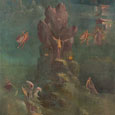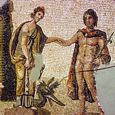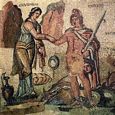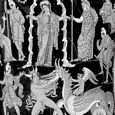KETOS AITHIOPIOS
Greek Name
Κητος Αιθιοπιος
Transliteration
Kêtos Aithiopios
Latin Spelling
Cetus Aethiopius
Translation
Ethiopian Sea-Monster
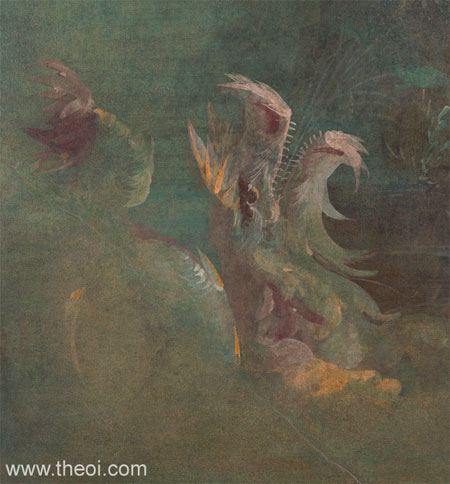
THE KETOS AITHIOPIOS (Cetus Aethiopius) was a sea-monster sent by Poseidon to ravage the land of Aithiopia (Ethiopia) as punishment for Queen Kassiopeia's (Cassiopeia's) hubristic boast that her daughter Andromeda was more beautiful than the Nereides. To assuage the wrath of the sea-gods, the girl was chained to a rock as a sacrificial feast for the monster. It was at this time that Perseus was winging his way back to Greece with the head of Medousa (Medusa). He spied the girl, flew down, slew the monster and carried her off as his bride. Some say the hero turned the monster to stone--a rock near the Lebanese town of Joppa frequented by ancient tourists.
The Sea-Monster, along with Perseus, Andromeda, and her parents King Kepheus (Cepehus) and Queen Kassiopeia, were placed amongst the stars of the sky as constellatons.
FAMILY OF THE SEA-MONSTER
PARENTS
Probably PHORKYS & KETO, though nowhere stated
ENCYCLOPEDIA
ETHIOPIAN SEA MONSTER. Cassiopeia boasted of her daughter Andromeda's beauty, and said that she surpassed the Nereids. The latter prevailed on Poseidon to visit the country by an inundation, and a sea-monster was sent into the land. The oracle of Ammon promised that the people should be delivered from these calamities, if Andromeda was given up to the monster; and Cepheus, being obliged to yield to the wishes of his people, chained Andromeda to a rock. Here she was found and saved by Perseus, who slew the monster and obtained her as his wife. (Apollod. ii. 4. § 3 ; Hygin. Fab. 64; Ov. Met. iv. 663, &c.) Athena placed her among the stars, in the form of a maiden with her arms stretched out and chained to a rock, to commemorate her delivery by Perseus. (Hygin. Poet. Astr. ii. 10, &c.; Eratosth. Catast. 17; Arat. Phaen. 198.) Conon (Narrat. 40) gives a wretched attempt at an historical interpretation of this mythus. The scene where Andromeda was fastened to the rock is placed by some of the ancients in the neighbourhood of Iope in Phoenicia, while others assign to it a place of the same name in Aethiopia. The tragic poets often made the story of Andromeda the subject of dramas, which are now lost.
Source: Dictionary of Greek and Roman Biography and Mythology.
ALTERNATE NAMES
Greek Name
Θηρ Θαλασσιος
Transliteration
Thêr Thalassios
Latin Name
Belua Ponti
Translation
Monster of the Deep
CLASSICAL LITERATURE QUOTES

Pseudo-Apollodorus, Bibliotheca 2. 43 (trans. Aldrich) (Greek mythographer C2nd A.D.)
:
"Arriving in Aithiopia (Ethiopia), which Kepheus (Cepheus) ruled, Perseus came upon his daughter Andromeda
laid out as a meal for a Ketos (Cetus, Sea-Monster). It seems that the king's wife Kassiepeia (Cassiopeia) had
challenged the Nereides in beauty, boasting that she outdid them all. As a result the Nereides were in a rage,
and Poseidon in sympathetic anger sent a flood-tide upon the land and a ketos as well. The oracle of Ammon
prophesied an end to the trouble if Kassiopeia's daughter Andromeda were served up to the Ketos as a meal, so
Kepheus, pushed to it by the Aithiopians (Ethiopians), tied his daughter out on a rock. When Perseus saw her it
was love at first sight, and he promised to kill the ketos and rescue the girl in return for her hand. Oaths
were sworn, after which Perseus faced and slew the Ketos, and set Andromeda free."
Pausanias, Description of Greece 4. 35. 9 (trans. Jones) (Greek travelogue C2nd A.D.)
:
"Red water, in colour like blood, is found in the land of the Hebrews near the city of Joppa. The water is
close to the sea, and the account which the natives give of the spring is that Perseus, after destroying the
Ketos (Cetus, Sea-Monster), to which the daughter of Kepheus (Cepheus) was exposed, washed off the blood in the
spring."
Philostratus the Elder, Imagines 1. 29 (trans. Fairbanks) (Greek rhetorician C3rd
A.D.) :
"[From a description of an ancient Greek painting at Neapolis (Naples) :] No, this is not the Red Sea
(thalassa Erythra) nor are these inhabitants of India, but Aithiopes (Ethiopians) and a Greek man in
Aithiopia. And of the exploit which I think the man undertook voluntarily for love, my boy, you must have
heard--the exploit of Perseus who, they say, slew in Aithiopia a Ketos (Cetus, Sea-Monster) from the Atlantikos
(Atlantic, "Sea of Atlas"), which was making its way against herds and the people of this land. Now
the painter glorifies this tale and shows his pity for Andromeda in that she was given over to the Ketos
(Sea-Monster). The contest is already finished and the Ketos lies stretched out on the strand, weltering in
streams of blood--the reason the sea is red--while Eros (Love) frees Andromeda from her bonds. Eros is painted
with wings as usual, but here, as it not usual, he is a young man, panting and still showing the effects of his
toil; for before the deed Perseus put up a prayer to Eros that he should come and with him swoop down upon the
creature, and Eros came, for he heard the Greek's prayer.
The maiden is charming in that she is fair of skin though in Aithiopia (Ethiopia) . . . Her beauty is enhanced
by the circumstances of the moment; for she seems to be incredulous, her joy is mingled with fear, and as she
gazes at Perseus she begins to send a smile towards him." [N.B. Philostratus places this myth on the
Atlantic coast of Africa rather than the Red Sea. "Aithiopes" was a general term encompassing all of
black Africa.]
Pseudo-Hyginus, Fabulae 64 (trans. Grant) (Roman mythographer C2nd A.D.) :
"Cassiope (Cassiopeia) claimed that her daughter Andromeda's beauty excelled the Nereids'. Because of this,
Neptunus [Poseidon] demanded that Andromeda, Cepheus' daughter, be offered to a Cetus (Sea-Monster). When she
was offered, Perseus, flying on Mercurius' [Hermes] winged sandals, is said to have come there and freed her
from danger."
Pseudo-Hyginus, Astronomica 2. 9 :
"Euripides [Greek tragedian early C5th BC] and the rest have shown that he was the son of Phoenix, king of
the Aethiopains (Ethiopians), and father of Andromeda, the girl exposed to the Sea-Monster, according to the
well-known tale. Perseus freed her from danger and made her his wife. And so, that the whole family be
commemorated, the gods numbered Cepheus, too, among the constellations."
Pseudo-Hyginus, Astronomica 2. 11 :
"Perseus, who freed her [Andromeda] from danger when exposed to the Cetus (Sea-Monster)."
Pseudo-Hyginus, Astronomica 2. 31 :
"Constellation Cetus (Sea-Monster). With regard to the Cetus, they say that it was sent by Neptunus
[Poseidon] to kill Andromeda, about whom we have already spoken. But because it was killed by Perseus, on
account of its huge size and his valour it was placed amongst the constellations."

Ovid, Metamorphoses 4. 669 ff (trans. Melville) (Roman epic C1st B.C. to C1st A.D.)
:
"Where Cepheus ruled the Aethiopes (Ethiopians) there, innocent, by Ammon's [Poseidon's] unjust decree
condemned to suffer for her mother's [Kassiopeia's (Cassiopeia's)] tongue, Andromeda was pinioned to a rock.
When Abantiades [Perseus] saw her, had a wafting breeze not stirred her hair, her eyes not overflowed with
trembling tears, he had imagined her a marble statue. Love, before he knew, kindled; he gazed entranced; and
overcome by loveliness so exquisite, so rare, almost forgot to hover in the air. He glided down. ‘Shame on
those chains!’ he cried, ‘The chains that you deserve link lovers' hearts. Reveal, I beg, your name
and this land's name and why you wear these shackles.’
She at first was silent, too abashed to face a man . . . as he urged again, lest it should seem her own offence
she dreaded to confess, she told her name, her country and the tale of her proud mother's [Kasiopeia's
(Cassiopeia's)] beauty--boast and bane.
Ere all was told a noise came from the sea, and from the ocean's depths a Sea-Monster (Belua Ponti)
loomed up, its breast spread wide across the waves. She screamed. Her wretched father stood close by, her mother
with him, both in dire distress, though she with juster cause. They brought no aid, but wailed and wrung their
hands, as well they might, and clasped the shackled girl; and, as they clung, the stranger spoke : ‘Long
time is left for tears, but short the hour for succour. I, Perseus, the son of Jove [Zeus] and her whom, in her
prison, Juppiter's [Zeus'] golden shower made fertile; I, Perseus, snake-haired Gorgo's victor; I, who dared on
soaring wings to ride the winds of heaven--if I should woo this damsel, none for sure could be my rival as your
son-in-law. To dower so glorious I aim to add, with heaven's help, my service; and I strike a bargain--if my
valour's bold design avail to rescue her, she shall be mine.’
They take his terms--for who would hesitate?--beseech his aid and add as dower their realm. Look! As a galley
with its pointed prow furrows the sea when rowers sweat and strain, the beast breast on and rolls the waves
aside.
And now it was no further from the cliff than Balearic slings can hurl the flying lead across the sky, when the
son of Jove [Zeus] suddenly sprang from the ground and soared into the clouds. The Draco (Dragon) saw his shadow
on the sea and savaged what it saw . . . Inachides [Perseus], swooping headlong through the void, attacked the
monster's back and, as it roared, deep in its shoulder sank his crescent blade. Wounded so sore, the beast now
reared upright, high in the air, now dived below the waves, now turned like a fierce boar in frenzy when the
pack bays all around. On his swift wings Perseus eludes the snapping fangs and strikes the parts exposed and
plunges his curved sword between its ribs and in its back, all rough with barnacles, and where its tapering tail
ends in a fish. The beast belched purple blood, sea spume and blood together. Perseus' plumes were soaked with
spray, so heavy he could trust his ankle-wings no longer; then he saw a rock, bare in the still water but awash
in rising seas. On this he braced himself, his left hand on a ridge, and with his sword stabbed time and time
again the monster's groin.
Cheers filled the shore and echoed round the halls of heaven. Cepheus and Cassiope (Cassiopeia) with rapturous
hearts saluted their new son, the stay and saviour of their house. The girl, released, stepped forth unfettered
from her chains, the cause, the recompense of all his pains."
Ovid, Metamorphoses 5. 16 ff :
"[Kepheus (Cepheus) addresses his brother Phineus the betrothed of Andromeda :] ‘It was not Perseus
who took her [Andromeda] from you, if you want the truth; it was the Nereides and was horned Ammon's
[Poseidon's] wrath, it was that Sea-Monster (Belua Ponti) who came to feast upon my flesh and
blood.’"
Propertius, Elegies 2. 28 (trans. Goold) (Roman elegy C1st B.C.) :
"Andromeda was vowed as sacrifice to the Monster of the Deep (Monstris Marinis): she, none other,
became the famed wife of Perseus."
Pliny the Elder, Natural History 5. 69 (trans. Rackham) (Roman encyclopedia C1st
A.D.) :
"Joppa [now the Israeli town of Jaffa] is said to have existed before the flood; it is situated on a hill,
and in front of it is a rock on which they point out the marks made by the chains with which Andromeda was
fettered; here there is a cult of the legendary goddess Ceto (the Sea-Monster)."
[N.B. Keto (Ceto) was the goddess of sea-monsters and whales.]
Nonnus, Dionysiaca 8. 88 ff (trans. Rouse) (Greek epic C5th A.D.) :
"Behold the Ketos (Cetus, Sea-Monster), the sickle of Perseus, the figure of Andromeda, the glare of Gorgon
Medousa (Medusa), whom Kronides (Cronides) will establish in Olympos [i.e. as constellations] by and by.”
Nonnus, Dionysiaca 18. 294 :
“Perseus killed the Ketos (Cetus, Sea-Monster) beside the Erythraian Sea [the Red Sea].”
Nonnus, Dionsyiaca 25. 80 :
“Perseus killed a Ketos (Cetus, Monster of the Sea); with Gorgon's eye he turned to stone a leviathan of
the deep!”
Nonnus, Dionsyiaca 30. 273 ff :
“The monster of the deep (Ther Thalassios) turned to stone [by Perseus] . . . the Nereides tremple before
Andromeda's husband.”
Nonnus, Dionysiaca 31. 10 ff :
“Seeing the heap of Andromeda's broken chains beside the Erythraian Sea [the Red Sea], and that rock lying
on the sand, Earthshaker's [Poseidon's] monstrous lump [i.e. the Sea-Monster petrified by Perseus].”
Nonnus, Dionysaica 47. 510 ff :
“Perseus turned into stone a whole huge monster of the deep (Ketos) . . . and on the wing loosed the
chains of Andromeda and offered the stone sea-monster as a worthy bridal gift.”
ANCIENT GREEK & ROMAN ART
SOURCES
GREEK
- Apollodorus, The Library - Greek Mythography C2nd A.D.
- Pausanias, Description of Greece - Greek Travelogue C2nd A.D.
- Philostratus the Elder, Imagines - Greek Rhetoric C3rd A.D.
- Nonnus, Dionysiaca - Greek Epic C5th A.D.
ROMAN
- Hyginus, Fabulae - Latin Mythography C2nd A.D.
- Hyginus, Astronomica - Latin Mythography C2nd A.D.
- Ovid, Metamorphoses - Latin Epic C1st B.C. - C1st A.D.
- Propertius, Elegies - Latin Elegy C1st B.C.
- Pliny the Elder, Natural History - Latin Encyclopedia C1st A.D.
BIBLIOGRAPHY
A complete bibliography of the translations quoted on this page.
